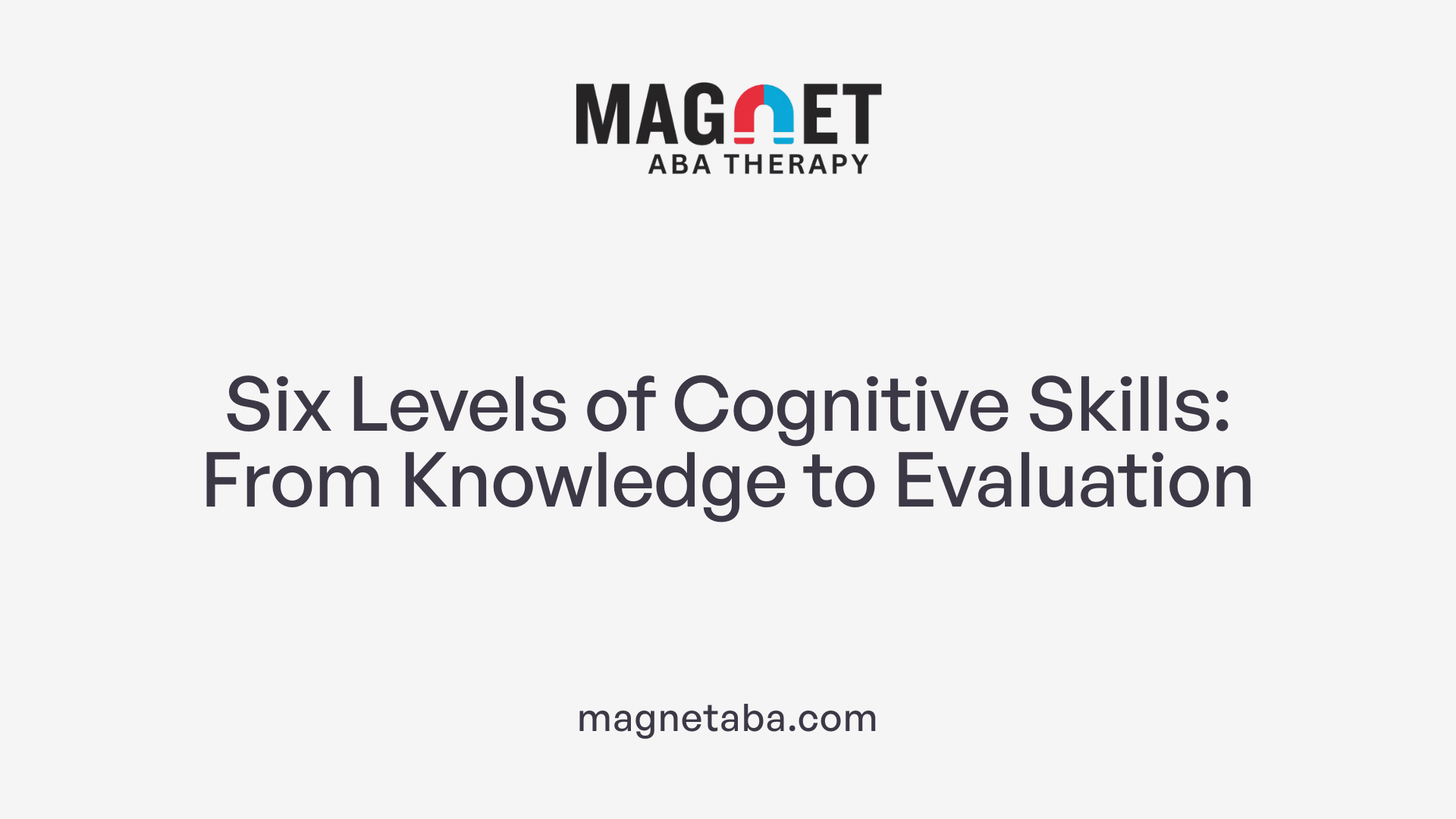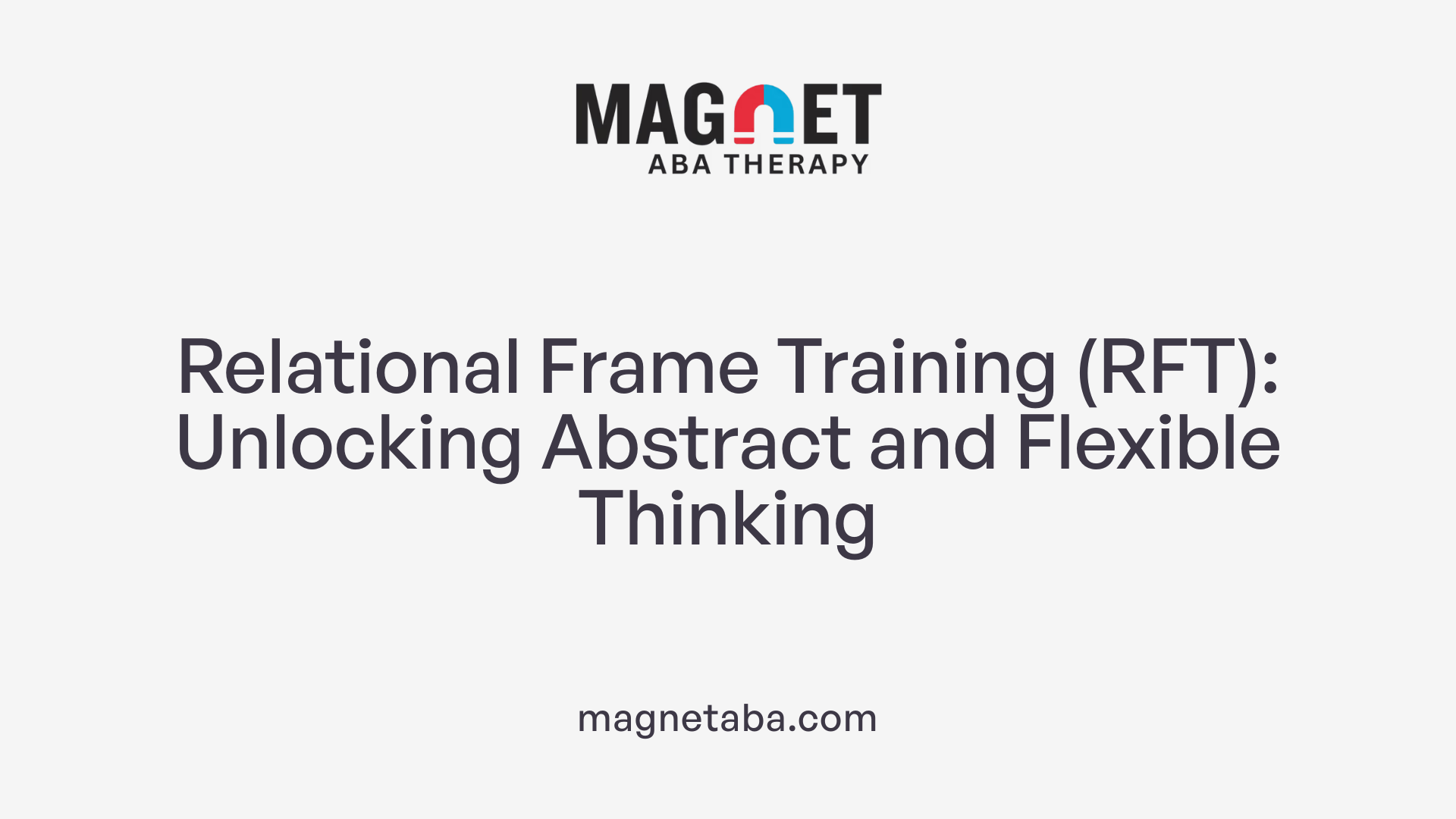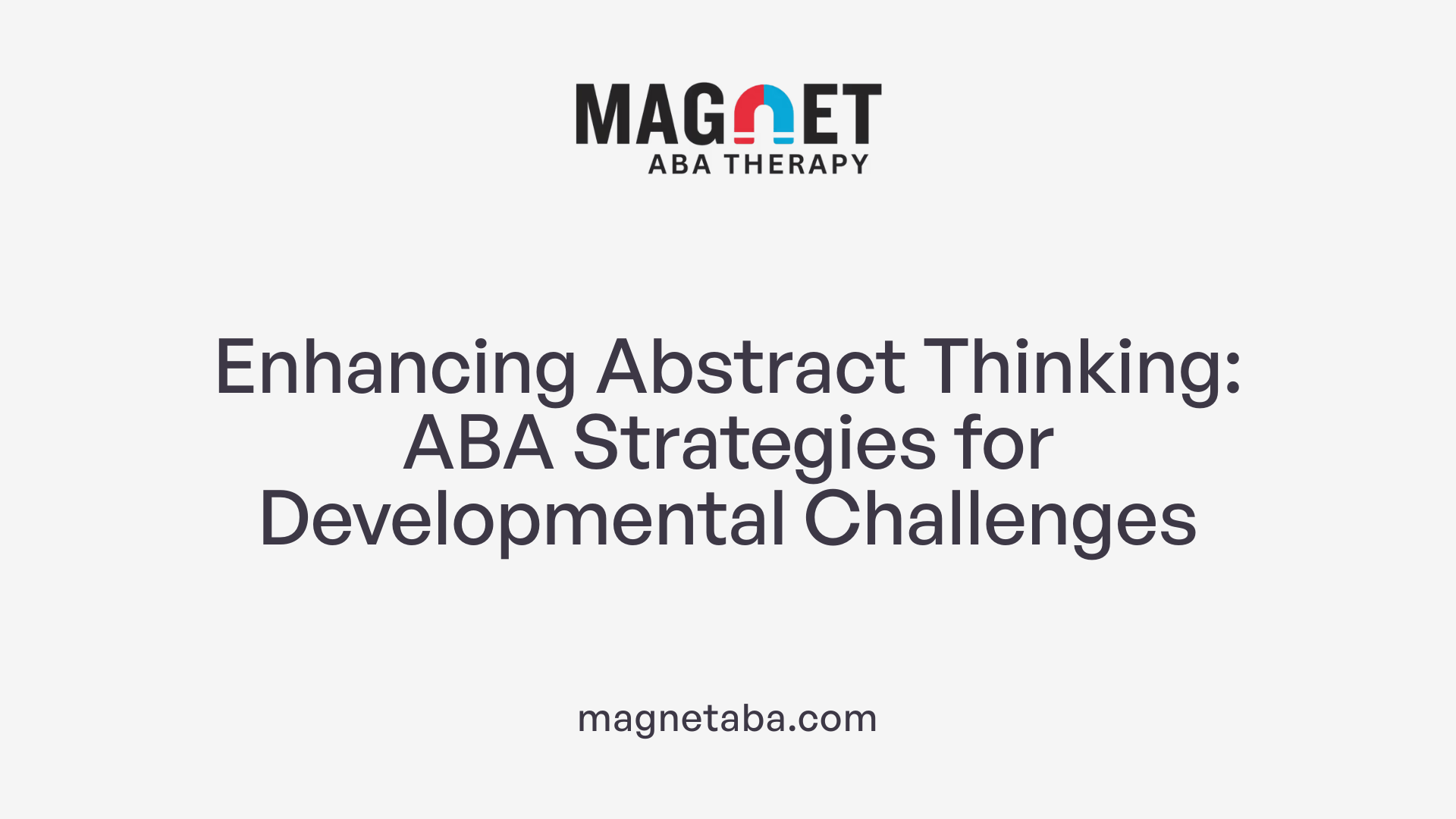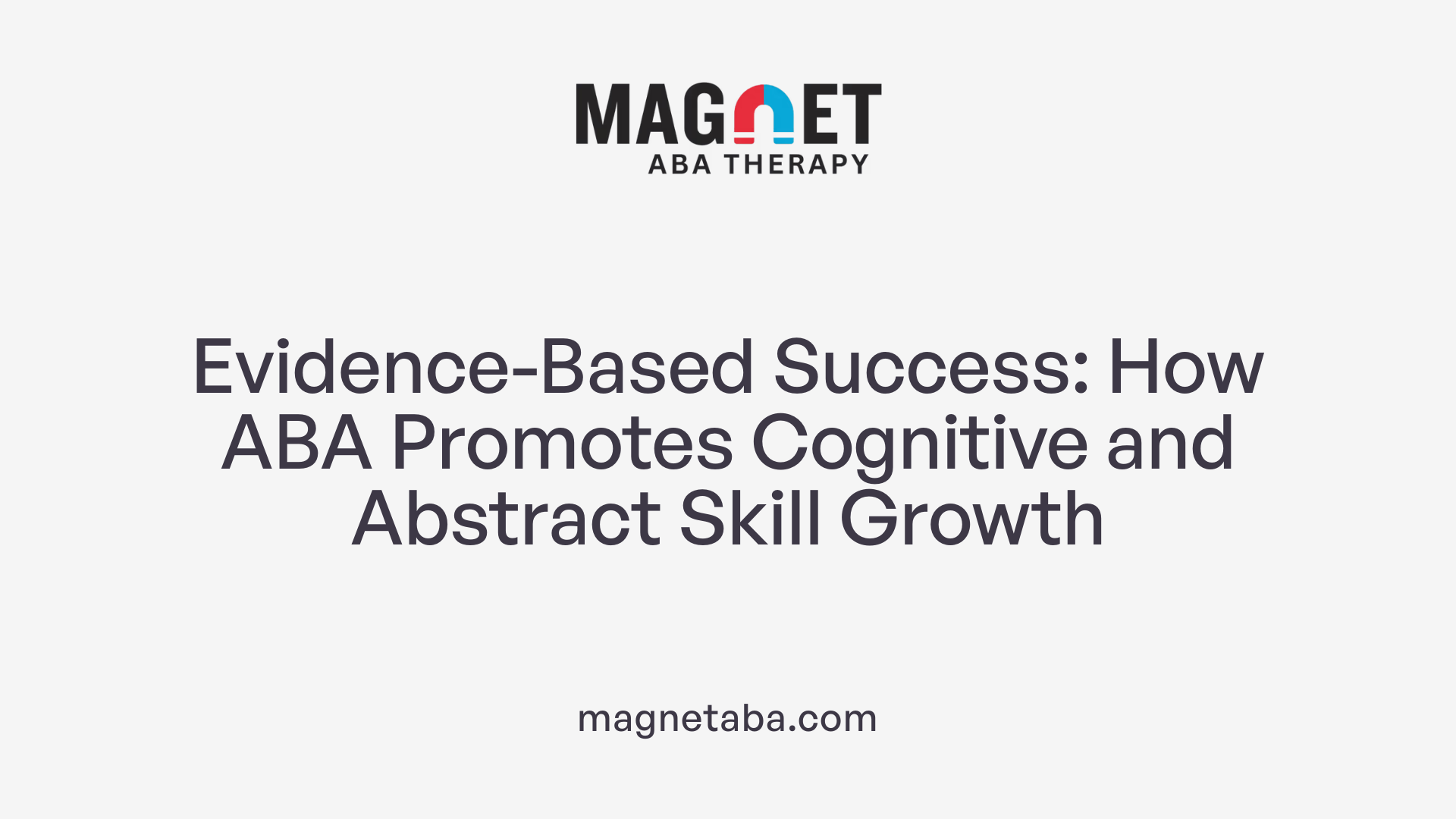Understanding the Foundation of Abstract Thinking and the Role of ABA
Abstract thinking— the ability to understand and manipulate concepts that are not directly observable— is crucial for problem-solving, reasoning, and adaptive functioning. Supporting its development through Applied Behavior Analysis (ABA) offers a structured approach to fostering higher-order cognitive skills in children, particularly those with developmental challenges such as autism spectrum disorder (ASD). This article explores how ABA techniques and Relational Frame Training (RFT) can effectively promote abstract thought, with insights into evidence-based practices, educational strategies, and ongoing research.
Fundamentals of Cognitive Development and Its Relevance to ABA

How does cognitive development influence our understanding of the world?
Cognitive development encompasses a broad set of skills that enable individuals to think, learn, and interpret their surroundings. It involves processes such as taking in information, processing it, learning language, and forming an understanding of what happens around us. These skills are crucial for making sense of daily experiences, solving problems, and navigating social interactions.
This development is shaped by both innate factors, like genetics, and environmental influences such as experiences and interactions. The combined effect of these elements helps determine a child's cognitive abilities at various stages.
What are the six levels of cognitive skills?
Cognitive skills can be categorized into six distinct levels:
| Level | Description | Examples |
|---|---|---|
| Knowledge | Recognizing facts and basic concepts | Naming objects, recalling facts |
| Comprehension | Understanding information and ideas | Explaining a story, interpreting instructions |
| Application | Using knowledge in real-world situations | Applying math in shopping, following recipes |
| Analysis | Breaking down information into parts | Comparing two concepts, identifying motives |
| Synthesis | Combining information to create new ideas | Writing essays, designing experiments |
| Evaluation | Judging and forming opinions | Critiquing a work of art, making decisions |
Recognizing these levels helps tailor educational and behavioral interventions to suit a child's current capabilities.
How do innate factors and environment influence cognitive development?
Cognitive growth results from a dynamic interplay between genetics and experiences. Hereditary factors may provide a baseline for certain abilities, such as memory or language aptitude. Meanwhile, environmental inputs—like interactions with caregivers, education, and exposure to new activities—foster growth and refinement of these skills.
In applied behavior analysis (ABA), understanding a child's current cognitive level allows practitioners to develop personalized interventions that support progression through developmental stages. This alignment ensures that learning strategies are appropriate and effective.
How does ABA support cognitive advancement?
ABA programs utilize principles like reinforcement, prompting, and systematic task breakdowns to promote skill acquisition. Techniques such as Discrete Trial Training (DTT) and Naturalistic Teaching help children develop reasoning, problem-solving, and language skills.
Incorporating developmental insights from theorists like Jean Piaget ensures that teaching strategies match the child's cognitive maturity level. For example, interventions for children in the concrete operational stage focus more on hands-on, practical activities. When combined with speech and language therapy, ABA further enhances communication, which is essential for mastering higher cognitive functions.
Can ABA help children progress through cognitive stages?
Yes, ABA interventions, grounded in developmental principles, can facilitate progression through various cognitive stages. By promoting skills at each level and ensuring skill generalization across settings, ABA helps children build a more flexible and sophisticated understanding of the world.
This approach supports cognitive growth and overall development, enabling a child to navigate complex tasks and social situations more effectively.
The Role of Relational Frame Training (RFT) in Fostering Abstract Thinking

What is the role of Relational Frame Training (RFT) in fostering abstract thinking?
Relational Frame Training (RFT) is a structured behavioral approach that emphasizes understanding and responding to complex relational concepts. Based on Relational Frame Theory, RFT develops an individual's ability to comprehend relations like 'more than', 'less than', or 'same as'.
This training enhances higher-level cognitive skills by teaching learners to relate different stimuli flexibly and abstractly. As a result, they can generalize learned relations to new situations without explicit teaching, which is essential for abstract thinking.
How RFT enhances understanding of complex relational concepts
By focusing on the relationships between stimuli, RFT helps children and adults understand not just concrete relations but also more complex, abstract connections. This fosters cognitive flexibility, allowing individuals to switch perspectives and understand multiple relationships simultaneously.
For example, RFT activities might involve understanding how two concepts relate in different contexts or recognizing patterns that repeat across different situations, thus improving problem-solving and reasoning.
The use of structured programs like PEAK and SMART in improving relational responding
Programs such as PEAK (Promoting the Emergence of Advanced Knowledge) and SMART (Systematic Model of Relational Training) incorporate RFT principles into systematic curricula. These programs teach relational responding through a series of progressive stages, encouraging children to develop increasingly sophisticated relational skills.
In PEAK, learners are guided to form relations involving functions, classes, and perspective-taking, which are crucial for cognitive development. The SMART program emphasizes teaching through explicit, engaging activities that foster relational flexibility, generalization, and emotional understanding.
Empirical evidence of RFT's effectiveness in increasing cognitive flexibility and IQ scores
Research indicates that incorporating RFT into interventions leads to noticeable improvements in cognitive flexibility. Studies have demonstrated that children who undergo relational training not only perform better on tasks requiring abstract reasoning but also show rises in standardized IQ scores, such as on the Wechsler scales.
Recent experiments have confirmed that RFT-enhanced interventions can produce substantial gains in mental agility and problem-solving skills. These findings suggest that RFT-based approaches are promising tools for boosting overall cognitive development.
| Aspect | Influence | Details |
|---|---|---|
| Core Focus | Relational flexibility | Teaching to relate stimuli in multiple ways |
| Programs | PEAK, SMART | Structured curricula rooted in RFT |
| Outcomes | Cognitive flexibility | Improved problem-solving and reasoning |
| Evidence | Empirical studies | Show increases in IQ scores and adaptability |
In summary, RFT plays a vital role in promoting abstract thinking by teaching flexible relational skills, which translate into improved cognitive functions and social understanding. Its proven effectiveness makes it a valuable addition to interventions aimed at fostering complex thought and intelligence.
Applying ABA Techniques to Boost Abstract Thinking in Children with Developmental Challenges

How can ABA techniques be applied to enhance abstract thinking in children with developmental challenges?
Applied Behavior Analysis (ABA) offers practical strategies to support the development of abstract thinking, which is vital for reasoning, problem-solving, and understanding complex concepts. By tailoring interventions to each child's developmental level, ABA often includes reinforcement, modeling, and visual aids.
Using structured environments with predictable routines helps children grasp and generalize new ideas. Visual supports like pictures, charts, or symbols make abstract concepts more accessible. Explicit instructions and consistent prompts guide children through understanding relationships like 'more than' or 'same as,' building a foundation for symbolic reasoning.
Activities such as problem-solving tasks, storytelling, and role play foster the use of symbols and abstract thinking. For example, dramatization exercises encourage children to imagine and represent different scenarios, enhancing their cognitive flexibility.
Creating safe spaces for exploration allows children to experiment with ideas and learn from experience without fear of failure. This is especially critical for children with autism or sensory sensitivities, who benefit from clear guidance and gradual exposure.
The key to success lies in implementing these techniques consistently both at school and at home. Caregivers and educators should reinforce progress with praise and rewards, helping children develop higher-level cognitive skills and apply them in daily life.
How can these methods be adapted for different environments?
In classrooms, teachers can incorporate visual schedules, social stories, and group activities focused on skills like categorization and relationship understanding. At home, parents can use everyday objects, storytelling, and play-based learning to reinforce these concepts.
Integrating ABA strategies into daily routines creates a cohesive learning experience, leading to improved abstract thinking, better problem-solving ability, and greater independence for children with developmental challenges.
Research Evidence Supporting ABA’s Effectiveness in Enhancing Cognitive and Abstract Skills

What research evidence supports the effectiveness of ABA in improving cognitive and abstract thinking skills?
Numerous studies provide strong support for ABA's role in enhancing cognitive abilities, especially in children with autism spectrum disorder (ASD). Systematic reviews and randomized controlled trials have consistently demonstrated that ABA interventions can lead to significant improvements in IQ, language development, social skills, and adaptive functioning.
Research shows that early, intensive ABA therapy can produce long-lasting positive outcomes. For example, children who receive focused ABA interventions often display considerable progress in abstract reasoning, problem-solving, and language comprehension. These improvements are measurable through standardized assessments and behavioral observations.
In addition to direct ABA techniques like discrete trial training and pivotal response treatment, other therapies such as speech therapy, occupational therapy, and cognitive-behavioral therapy (CBT) are frequently integrated. These combined approaches promote higher-order cognition and help children develop flexible thinking and hierarchical reasoning skills.
Studies also highlight that children are capable of acquiring abstract knowledge and applying it across different contexts, a sign of enhanced cognitive flexibility. This ability to generalize learned concepts stems from ABA strategies designed to teach relational framing—understanding relationships like 'more than' or 'same as'—which supports abstract thinking.
Overall, research validates ABA as an evidence-based practice that not only addresses immediate behavioral concerns but also fosters the development of complex cognitive and abstract skills critical for social and independent functioning.
| Source Type | Findings | Impact on Cognitive Skills |
|---|---|---|
| Systematic Reviews | Confirm ABA’s effectiveness in improving IQ, language, and social skills | Supports long-term cognitive gains |
| Randomized Controlled Trials | Show significant improvements after early intensive interventions | Highlights importance of early therapy |
| Meta-analyses | Validate improved adaptive behaviors and problem-solving | Demonstrates broad developmental benefits |
| Clinical Studies | Indicate improvements in hierarchical reasoning and abstraction | Confirm capacity for complex cognitive development |
These findings collectively reinforce the value of ABA in advancing not only behavioral goals but also essential cognitive and abstract reasoning abilities, ultimately leading to better educational and social outcomes for learners with ASD.
Educational Strategies and Activities Incorporating ABA for Abstract Thinking
What educational strategies and activities can incorporate ABA principles to promote abstract thinking?
Enhancing abstract thinking through ABA involves creating activities that challenge children to analyze, reason, and understand relationships beyond concrete experiences. One effective approach is utilizing task analysis and discrete trial training. These strategies break complex concepts into smaller, manageable steps, allowing learners to build understanding incrementally.
Natural environment teaching plays a crucial role by allowing children to apply their skills in everyday situations. This encourages generalization of concepts such as cause-and-effect and relational understanding. For example, during play or daily routines, children can practice making connections, drawing inferences, or categorizing objects.
In addition, visual aids are invaluable for illustrating abstract ideas like symbols, relationships, and patterns. Interactive technology—such as tablets or educational software—can engage children actively in learning and practicing abstract concepts. Role-playing activities stimulate imaginative and symbolic thinking, enabling children to experiment with scenarios that involve metaphorical or relational understanding.
Strategies like social skills training can foster perspective-taking and relational awareness, which are integral to abstract cognition. Sensory regulation practices support optimal engagement, ensuring that children are attentive and ready to learn.
By combining these techniques, educators can develop tailored activities that promote reasoning, problem-solving, and the understanding of relationships. This comprehensive approach aligns with ABA principles and supports the development of higher-level cognitive skills necessary for functional adaptation and social interaction.
The Significance of ABA in Developing Reasoning, Problem-Solving, and Critical Thinking
Why is ABA important in promoting problem-solving, reasoning, and critical thinking skills?
Applied Behavior Analysis (ABA) plays a vital role in fostering these essential cognitive skills. It employs structured, goal-oriented activities designed to teach individuals how to apply learned concepts in various real-life situations.
ABA therapy involves engaging children in activities like structured play, role modeling, and sensory-based tasks. These methods reinforce positive behaviors and motivate children to participate actively, which is crucial for developing mental flexibility and reasoning.
Through consistent practice and reinforcement, children learn to analyze situations, explore multiple solutions, and adapt their thinking. For example, role-playing scenarios help children understand different perspectives and consequences, promoting critical thinking.
Importantly, ABA incorporates social and communication skills into learning activities. These are fundamental for reasoning and problem-solving because they enable children to express ideas, ask questions, and absorb feedback.
This systematic approach personalizes interventions to meet each child's specific needs, ensuring they develop the independence needed for thoughtful decision-making.
By integrating structured activities with positive reinforcement, ABA creates an environment where children can build their reasoning capacity, solve problems more effectively, and develop skills necessary for everyday life and social interactions.
| Method | Application | Benefit |
|---|---|---|
| Goal-Directed Activities | Planning tasks that target specific outcomes | Encourages intentional thinking and decision-making |
| Role Play and Imitation | Simulating real-world scenarios | Enhances perspective-taking and problem-solving |
| Sensory and Play Tasks | Engaging in sensory-based and tactile activities | Promotes active participation and cognitive flexibility |
| Positive Reinforcement | Rewarding desired behaviors | Motivates continued effort and skill maintenance |
In summary, ABA’s structured approach systematically develops reasoning and problem-solving skills by encouraging active, motivated learning experiences.
Incorporating ABA into Early Childhood Education for Higher-Order Thinking
How can ABA principles be incorporated into early childhood education to support the development of abstract cognition?
Applied Behavior Analysis (ABA) offers valuable strategies for fostering higher-order thinking skills such as abstract cognition in young children, including those with developmental challenges. One effective way to do this is through systematic, data-driven practices like embedded instruction and functional behavior assessments.
Embedded instruction involves integrating learning opportunities into natural activities and routines. For example, teachers can embed skills training into play, meals, or daily routines, encouraging children to make connections, classify objects, and solve problems in real-world contexts. Functional behavior assessments help identify the purpose of behaviors, which allows educators to tailor interventions and reinforcement strategies that promote adaptive, flexible thinking.
Personalized reinforcement strategies are pivotal. By using individual preferences and motivating consequences, educators can reinforce behaviors that demonstrate problem-solving, symbolic reasoning, and cognitive flexibility. Techniques such as discrete trial training, pivotal response training, and naturalistic teaching adapt to each child's developmental level, making learning meaningful and engaging.
Authentic assessments and naturalistic teaching approaches emphasize observing children in real-life settings to gauge their cognitive abilities. These methods promote the development of abstract thinking by encouraging children to generalize skills across different environments and situations.
Training teachers and behavior analysts in ABA techniques ensures consistency and fidelity when implementing these strategies. Professional development programs can equip educators with the skills necessary to apply reinforcement, prompting, modeling, and task analysis effectively, fostering a classroom environment conducive to cognitive development.
Finally, consistently promoting these practices supports continuous growth in abstract cognition and adaptive skills. As children become more proficient in reasoning, problem-solving, and symbol use, they are better prepared to engage with complex concepts, adapt to new situations, and acquire lifelong learning skills. Integrating ABA within early childhood education thus creates a solid foundation for cognitive development that aligns with developmental principles and individual needs.
Fostering Lifelong Learning Through Evidence-Based Interventions
Supporting abstract thinking through ABA requires a multifaceted approach that combines effective behavioral techniques, targeted educational activities, and ongoing research insights. By harnessing the power of structured reinforcement, Relational Frame Training, and tailored interventions, practitioners and educators can unlock the potential for higher-order cognitive development in children. Embedding these strategies into early childhood settings and therapy sessions not only enhances immediate skill acquisition but also lays the foundation for adaptable, flexible thinkers capable of navigating complex social and academic environments. Continued research, professional training, and collaborative efforts are essential to refining and expanding the impact of ABA on abstract thinking, ultimately promoting lifelong learning and cognitive resilience.
References
- Cognitive Development: How We Think and What that Means in ABA
- Mind Links: How RFT Supercharges ABA Therapy - Daytastic ABA
- Applied Behavior Analysis in Early Childhood Education
- Evidence for abstract representations in children but not capuchin ...
- Promoting Abstract Thinking in Young Children - Miracle Recreation
- ABA Therapy for Problem-Solving and Critical Thinking Skills
- Development of abstract thinking during childhood and adolescence
- How Does Autism Affect Learning? | All Star ABA
- ABA Therapy & Indoor Activities for Children with Autism
- 12 Fun and Educational Activities for Students with Autism












